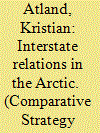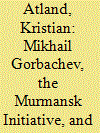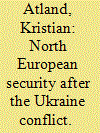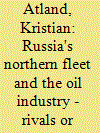|
|
|
Sort Order |
|
|
|
Items / Page
|
|
|
|
|
|
|
| Srl | Item |
| 1 |
ID:
132003


|
|
|
|
|
| Publication |
2014.
|
| Summary/Abstract |
The five states that surround the Arctic Ocean- Russia, Canada, the United States, Denmark, and Norway-have in recent years taken various measures to protect their economic and security interests in the north. The measures include not only the adoption of Arctic strategies, but also the development of new military capabilities. As in other parts of the world, one state's military efforts to enhance its security may have the unfortunate effect of making others feel less secure, and therefore more likely to undertake similar efforts. Thus, despite being a low-tension region, the Arctic is by no means immune to the logic of the security dilemma.
|
|
|
|
|
|
|
|
|
|
|
|
|
|
|
|
| 2 |
ID:
080339


|
|
|
|
|
| Publication |
2007.
|
| Summary/Abstract |
Up to the late 1980s, the European Arctic was among the most heavily militarized regions in the world. After the end of the Cold War, however, the Russian Northern Fleet, based on the remote Kola Peninsula, went into a state of crisis and decay. Investments dried up and there was little political will to modernize the country's sea-based nuclear deterrence forces. But centrally placed actors in the Defense Ministry, the General Staff and the Military-Industrial Complex wanted to revitalize the once powerful and feared nuclear fleet. First Deputy Defense Minister (1992-1997) Andrei Kokoshin wrote a secret concept on how to create a new "Strategic Bastion" in the North. This article discusses the concept's background, content, and consequences
|
|
|
|
|
|
|
|
|
|
|
|
|
|
|
|
| 3 |
ID:
083438


|
|
|
|
|
| Publication |
2008.
|
| Summary/Abstract |
In October 1987, during a visit to the Kola Peninsula, the Secretary-General of the Soviet Communist Party, Mikhail Gorbachev, launched a series of policy initiatives which ultimately came to mark the beginning of the end of the Cold War era in the Arctic. The move was aimed at transforming the northern part of the globe from being a sensitive military theatre to becoming an international `zone of peace'. This objective was to be achieved through the establishment of a nuclear weapons-free zone in Northern Europe, restrictions on naval activities in Arctic seas, and the development of transborder cooperation in areas such as resource development, scientific exploration, indigenous people's affairs, environmental protection and marine transportation. This article analyses the contents of the Murmansk initiative, the context in which it was launched, the extent to which it materialized, and the degree to which it contributed to a normalization of interstate relations in the Arctic. In addition to being motivated by historical interest, the article aims at exploring the Copenhagen School concept of `desecuritization' and shedding light on the challenges and opportunities of turning security issues into non-security issues.
|
|
|
|
|
|
|
|
|
|
|
|
|
|
|
|
| 4 |
ID:
145167


|
|
|
|
|
| Summary/Abstract |
Russia’s illegal occupation and annexation of the Crimean peninsula in February–March 2014, and the country’s well-documented involvement in the separatist conflict in Eastern Ukraine, have led to a significant worsening of Russia’s relations with the West. Vladimir Putin’s move to redraw Russia’s southern borders through the use of military force and subversive measures has given rise to an uncertainty that goes well beyond the post-Soviet space. Since 2014, North Atlantic Treaty Organization (NATO) has had to reassess many aspects of its relationship with Russia. The alliance has also initiated various measures to strengthen the military security of its eastern member states, particularly the Baltic states, Poland, and Romania. Further to the North, NATO’s northernmost member – Norway – is following developments in Russia with a heightened sense of awareness. The same goes for non-aligned Sweden and Finland, which are trying to adapt to the emerging, and increasingly complex, security environment in Northern Europe.
|
|
|
|
|
|
|
|
|
|
|
|
|
|
|
|
| 5 |
ID:
106767


|
|
|
|
|
| Publication |
2011.
|
| Summary/Abstract |
In 2008, Russian leaders stated their intention to make the Arctic Russia's 'primary resource base'. This, and the region's growing importance as an arena for marine transportation and resource extraction, has led observers to question the longterm stability of the northern part of the globe and predict a new military buildup on the Kola Peninsula. Based on a review of Russia's previous behaviour in the Arctic, recent strategies and doctrines, the pattern of civil-military relations, and trends in the development of Russia's military forces in the region, this article argues that the role of the region in contemporary Russian security policy and defence planning should not be exaggerated. This analysis concludes that the character of Russian Arctic policy will largely depend on relations with NATO and the policies adopted by other Arctic rim states. The region's growing economic significance, the existence of unresolved jurisdictional issues, and the 'action-reaction' dynamics in the military field may lead to a strengthening of the military dimension in Russia's Arctic policies, but this does not mean greater militarization of the region is inevitable or even likely. Tensions in the Barents Sea region and other parts of the Arctic are much lower today than in the days of the Cold War, and hard security concerns in the Arctic do not figure at the top of Russia's current security agenda. While Russia's Arctic policy in the past was governed by national security interests, it is now increasingly governed by national economic interests and the interests of companies closely associated with the Russian state.
|
|
|
|
|
|
|
|
|
|
|
|
|
|
|
|
| 6 |
ID:
085377


|
|
|
|
|
| Publication |
2009.
|
| Summary/Abstract |
Described as one of the world's most promising new energy provinces, the European Arctic is no longer primarily seen as a military playground. Russia's approach to the region is increasingly governed by national economic interests rather than by national security interests. The development of offshore oil and gas fields, the construction of new pipelines and terminals, the increasing traffic of oil tankers to Western Europe and the United States, and the conversion of naval yards to civilian production represent both new challenges and new opportunities for the Russian Navy. Issues that were previously considered crucial to the country's national security have slowly but steadily been "desecuritized," and new patterns of civil-military relations have emerged. This article discusses the relationship between the Russian petroleum industry and the Northern Fleet and the interplay between Russian commercial and military interests in the post-cold war European Arctic.
|
|
|
|
|
|
|
|
|
|
|
|
|
|
|
|
| 7 |
ID:
085476


|
|
|
|
|
| Publication |
2008.
|
| Summary/Abstract |
Drawing on the constructivist concept of 'securitisation', this article analyses Russia's perceptions of, and responses to, Norway's Svalbard policy in the 1990s and 2000s. The analysis focuses on three policy issues which have figured prominently on Russia's arctic security agenda in recent years: (1) the establishment and use of civilian radars and satellite ground stations on the archipelago, (2) the adoption of the Svalbard Environmental Protection Act, and (3) the Norwegian Coast Guard's fishery enforcement measures in the Svalbard Fisheries Protection Zone. The article concludes that despite the changes that have taken place in the Euro-Arctic region after the Cold War, Svalbard has not ceased to be a security concern for Russia.
|
|
|
|
|
|
|
|
|
|
|
|
|
|
|
|
|
|
|
|
|